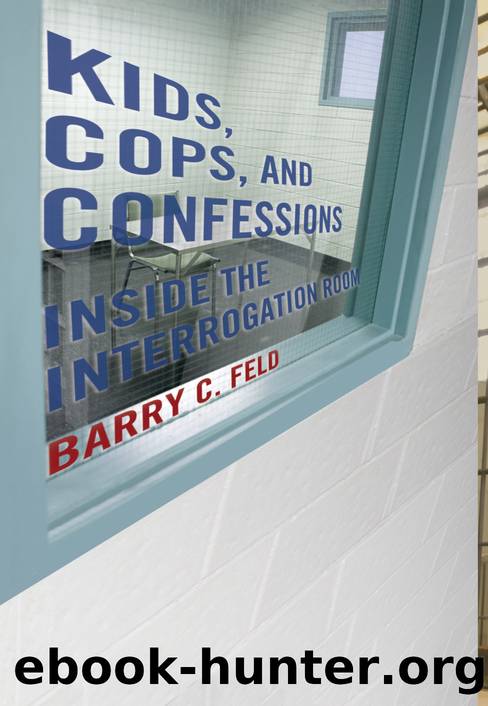Kids, Cops, and Confessions by Barry C. Feld

Author:Barry C. Feld
Language: eng
Format: epub
Publisher: New York University Press
Published: 2013-08-15T00:00:00+00:00
II. Miranda and Case Processing
How does a juvenileâs decision to waive or invoke Miranda affect how a court handles his or her case? Theoretically, defendants enjoy the protections of the Due Process modelâan adversarial systemâin which they may invoke procedural safeguards and force the state to prove its case. In reality, the justice system much more closely resembles the Crime Control model, in which confessions lead to guilty pleas. A confession creates âa strong disincentive for the suspectâwho has already incriminated himself in the most damning of waysâto take his case to trial and risk being convicted of the most serious possible charges and receiving the harshest possible punishment.â60 As one officer explained, âIf you get a good solid statement from them, the likelihood of having to go to court and to take other people through that process, such as witnesses, is almost nonexistent. We donât go to court on juvenile cases. I think that is maybe a testament to the fact that 85% or more give confessions. That coupled with the physical evidence and witnessesâ statements pretty much locks them in.â
A confession greatly tilts the balance of advantage in favor of the state.61 Defendants who confess have less plea-negotiation leverage than do those who remain silent. Research on adults indicates that suspects who confess seldom have a jury trial and receive fewer plea concessions than do suspects who do not make a statement.62 Prosecutors charge offenders who confess with a greater number of and with more serious crimes, set higher bail, offer fewer charge reductions, and dismiss fewer charges than against those who remain silent.63 One study reported that â[d]efendants who confessed were more likely to be convictedâand more likely to be convicted of more serious chargesâthan those who did not.â64 Defense attorneys may pressure a client who confesses to accept a guilty plea to avoid the risks of trial and a harsher sentence.65
Download
This site does not store any files on its server. We only index and link to content provided by other sites. Please contact the content providers to delete copyright contents if any and email us, we'll remove relevant links or contents immediately.
The 1921 Tulsa Race Massacre by Chris M. Messer(344)
Introduction to Criminal Justice - A Balanced Approach by Brian K. Payne Willard M. Oliver Nancy E. Marion(291)
Russia's Sakhalin Penal Colony, 1849â1917 by Andrew A. Gentes(272)
Punishing the Poor The Neoliberal Government of Social Insecurity by Unknown(271)
The History of Newgate Prison by Jowett Caroline;(248)
Serial Killers America and UK - 2 BOOKS IN 1 by Clark Matthew(241)
A History of Police and Masculinities, 1700-2010 by David G. Barrie Susan Broomhall(218)
Restorative Justice in Transitional Settings by Kerry Clamp(196)
Culture, Crime and Punishment by Ronald Kramer(184)
Dangerousness, Risk and the Governance of Serious Sexual and Violent Offenders by Karen Harrison(178)
Organized Crime and Corruption Across Borders by T. Wing Lo Dina Siegel Sharon I Kwok(177)
Routledge Handbook on Immigration and Crime by Holly Ventura Miller Anthony Peguero(176)
The Real CSI by Kate Bendelow(174)
Cops, Cameras, and Crisis by Michael D. White Aili Malm(173)
Policing Gender, Class And Family In Britain, 1800-1945 by Linda Mahood(168)
Women Exiting Prison by Bree Carlton Marie Segrave(163)
A Theory of African American Offending by James D. Unnever Shaun L. Gabbidon(163)
Using Murder by Philip Jenkins(160)
Losing Legitimacy by Gary Lafree(154)
